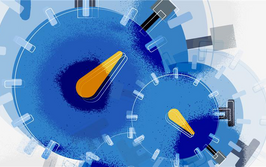Giving the GIFT of Genomic Mapping
Scientists introduce an innovative approach to genomic mapping called genomic informational field theory (GIFT), which could boost our understanding of genotype–phenotype relationships.

Credit: AdobeStock.com
A team of scientists led by Cyril Rauch and Panagiota Kyratzi at the UK’s University of Nottingham, has introduced genomic informational field theory (GIFT) – a mapping approach that could help improved our understanding of genotype–phenotype relationships. From target identification, drug efficacy, safety, and biomarker development to clinical trial stratification and regulatory considerations, genotype–phenotype relationship knowledge helps researchers tailor drug development to produce safer, more effective, and patient-specific therapies.
GWAS methods have long been the standard for associating genetic variations with phenotypic traits; however, though powerful, these methods rely heavily on statistical averages, leading to certain limitations. By focusing on averages and variances, GWAS can miss critical variations within categories, potentially overlooking subtle but vital genotype–phenotype relationships.
To circumvent these limitations, Rauch, Kyratzi, and their team developed GIFT. Unlike GWAS, which uses a “bottom-up” approach to evaluate gene contributions to traits, GIFT takes a “top-down” approach to assess how phenotypes might select certain genetic expressions or microstates essential for their maintenance. This approach avoids categorizing data into broad groups, instead providing a full information profile.
Through real-world application on two datasets obtained from sheep, the researchers demonstrated that GIFT extracts richer information than GWAS, providing a broader view and revealing multiple significant regions. In the first dataset, GIFT revealed that a bone structure trait was influenced by more than one genetic region, thus presenting it as a “complex trait” rather than a single-gene trait. In a second dataset, GIFT analysis uncovered new insights into the genetic network influencing a complex metabolic cycle. Notably, GIFT identified regulatory variants that GWAS missed, showing that phenotypic effects may be influenced by genetic “paths” or ordered configurations of genetic expression, hinting at deeper regulatory mechanisms within the genome.
GIFT’s top-down methodology means that it could also be applied to phenotypic plasticity — the ability of an organism to change in response to its environment. As the study highlights, GIFT can map genes that may be “waiting” for certain environmental cues to express specific phenotypes. Such information could feed into precision medicine, where understanding the interplay between genetic potential and environmental triggers could lead to more effective interventions.
Moreover, GIFT’s insights into regulatory variants — a class of genes often involved in controlling other genes’ activities — could further enhance gene-editing tools, such as CRISPR, by offering clearer targets for precise interventions.
The researchers emphasize that GIFT doesn’t just complement GWAS; it represents a shift in conceptualizing genetic research. But they also note that further validation in live animal models and human trials is needed before GIFT’s insights can be translated into practical applications. As a first step, researchers plan to investigate if GIFT can map similar regulatory variants in human complex traits.
Following a Bachelor’s degree in English Literature and a Master’s in Creative Writing, I entered the world of publishing as a proofreader, working my way up to editor. The career so far has taken me to some amazing places, and I’m excited to see where I can go with Texere and The Medicine Maker.



















